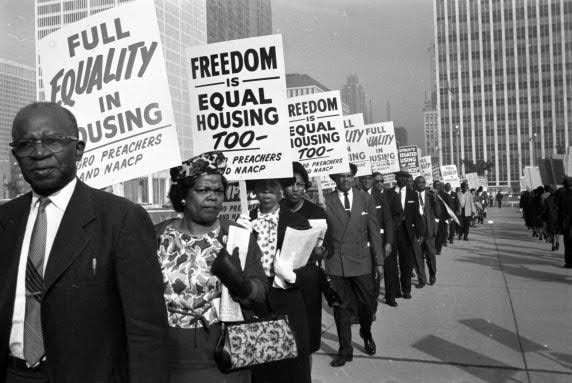Go to What's New
Submitted by Benjamin T Turner on

Black history and the history of the development of modern housing in America are deeply connected. The most notable link between the two is the impact the Civil Rights movement had on The Fair Housing Act of 1968 which forbids discrimination in the rent, sale or financing of housing based on race, color, national origin, religion, sex, disability or familial status.
After a long, hard-fought battle for equal treatment under the law, the Civils Rights Movement came to a head with the assassination of leader, and proponent of nonviolent civil disobedience, Martin Luther King, Jr.. The Fair Housing Legislation had been widely debated in congress. Understanding the importance of passing the legislation amidst the wave of emotions that followed King’s death, President Lyndon B, Johnson pressured congress to pass the bill which was a follow up to the Civil Rights Act of 1964.
The 1964 Act had banned, at least officially, the practice of segregation and discrimination on the basis of race, religion, gender, or national origin in public places and in employment, and it also prohibited federal funds from being used in any program which practiced discrimination. The Fair Housing Act applied these principles to the sale, rent or financing of housing. Later, the other minority groups were given protection under these laws.
So what does Fair Housing do for you? The Fair Housing Act ensures that everyone has equal access to appropriate housing. A single mom with children cannot be steered away from an available unit just because the landlord doesn’t like kids. A person who becomes wheelchair-bound can have reasonable accomodations made to meet their needs in an apartment they live in. A person in a minority group has equal opportunity to buy a home in whichever neighborhood they choose. Tenants who feel they are being treated unfairly have the ability to seek protection under the law. These guidelines promote stability in housing and provide equal access to all. They do not negate the requirement for individuals to meet basic criteria for qualifying for loans or for being approved for rental applications such as credit and criminal history, but they do ensure that denial can not be based simply on the decision maker’s dislike for a particular group or class of people.
Keep in mind that the federal law lays out certain layers of protection against discrimination, and each state has the ability to build on that through their own government, so fair housing laws vary from state to state. In Tennessee, any landlord who owns 4 or more rental units, whether individual single family homes, or a complex with 4 apartments, is subject to the fair housing laws and must abide by the basic non-discrimination rules. In reality, there are challenges in enforcing fair housing and challenges for the landlords, sellers or other housing professionals who are trying to be fair. The system is not perfect, but the guidelines in place have made the housing industry more accessible to those in various minority groups.
In short, all of the classes of citizens protected today can be grateful to the passion and perseverance of the many who fought for their rights during the Civil Rights Movement. We should also be inspired to continue to improve on these laws to ensure that everyone who calls America home can have the opportunity to live in a place that is truly home to them.
Heroes
https://afkinsider.com/34934/10-unsung-heroes-of-black-history/
Milestones
http://www.history.com/topics/black-history/black-history-milestones
Fair Housing Act
http://www.history.com/topics/black-history/fair-housing-act
https://bedrosian.usc.edu/blog/home-matters/the-black-history-of-housing...





